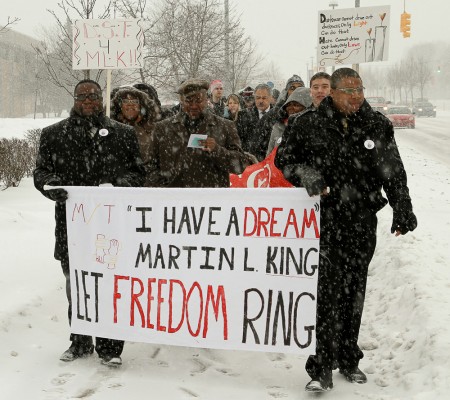
The first is recognition of the problem and admitting that with it, there cannot be growth in the community. Secondly, students should be looking for commonalities between themselves and other ethnicities, and assessing their assumptions, experiences, and attitudes pertaining to others. But Alspach’s last step to fighting racism is perhaps the most poignant of all.
“I would hope that students can put themselves in the position of someone who is facing discrimination, and feel what harm discrimination can do,” said Alspach.
This last reason is why some feel it is important that the Martin Luther King Day Celebration offers a variety of interactive experiences so students can better understand the sting of intolerance and what they can do to fight it.
One particularly moving event that took place on MLK Day was the Tunnel of Oppression, a multimedia exhibit allowing people to contemplate their perceptions of hate, oppression, and intolerance in our society by understanding the various types. It hoped to encourage greater sensitivity and acceptance toward others.
Another event was the MLK Freedom March, as MLK Celebration Planning Committee member Nicholas Campau highly recommended.
“It allowed the campus community to come together and show their support in an appropriate public forum. Participating in the March was also a great way to truly become a part of the MLK Celebration as well as participate in such a symbolic event,” said Campau.
Keynote speaker of the event was Dr. Marc Lamont Hill, an author, professor and cultural critic, who promised to provide wise insights on cultural issues and ways to promote healing at community and national levels.
Michael Wade, chair of the MLK Celebration Planning Committee and Assistant Director of Office of Multicultural Student Services, stressed the importance of taking the time and effort to honor Dr. King, and to encourage the continuance of his initiative toward fighting intolerance and his acceptance of all ethnicities.
“The MLK Celebration Planning Committee aims to educate the university community through a reflection on the past, and a significant examination of issues presently taking place in society. It is important for students to understand the importance of knowledge and leadership in society so that they will be influenced to take action to injustices in society,” said Wade.
According to dictionary.com, racism is defined as, “A belief or doctrine that inherent differences among the various human races determines cultural or individual achievement, usually involving the idea that one’s own race is superior and has the right to rule others.”
But Sandy Gholston, co-chair of the planning committee, had some thoughts on the word racism, and how it can bring clarity to the issue of prejudice.
“Our theme this year was ‘Leadership in a New Era,’ and we want our students here at Ferris to begin to understand what it means to become a leader by reflecting on the conditions that spurred great leaders like Dr. King into leadership. We also want our students to understand that while we may look different and come from different backgrounds, we’re all part of one race—the human race,” said Gholston.
Gholston hopes Ferris students can realize the differences that are present in the student body and accept them rather than look down on them.
“One of the best ways that Ferris students can begin to combat racism and all of the other ‘isms’ is by spending time around a diverse group of peers and beginning to understand not only those who are like you, but also those who may seem different than you. As those walls and barriers are broken down the differences become less significant,” said Gholston.
Another way students can fight intolerance is by careful decision of words and actions in their own lives.
“Students can start by looking at themselves. Do they participate or join in on racist jokes? Do they use racial slurs when talking about different segments of the population? Do they challenge family and friends when they hear racist remarks? At a university level, students are encouraged to report incidents involving issues of race, ethnicity, gender, sexual orientation, ability, religion, and nationality to the Diversity Action Team,” said Campau.
All the events promised to be eye-opening and honoring of the great man who changed the world through his truths of acceptance and peace. The Office of Multicultural Student Services has made great strides in promoting this message and encouraged the community of Ferris to do the same by participating in events and taking their own steps to make the campus and the world a better place for everyone.
“Students need to understand that racism does exist and comes in many forms. Understanding racism is an ongoing process that involves awareness of current events. The next step of taking action against racism is seeking out campus, local and national resources that can assist you,” said Wade.
For a complete listing of events, visit Ferris’ campus calendar at ferris.edu, or contact Wade at Mi*********@****is.edu. n
